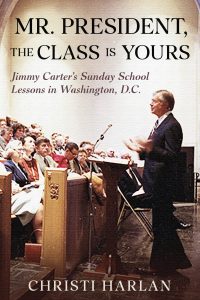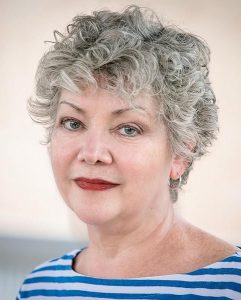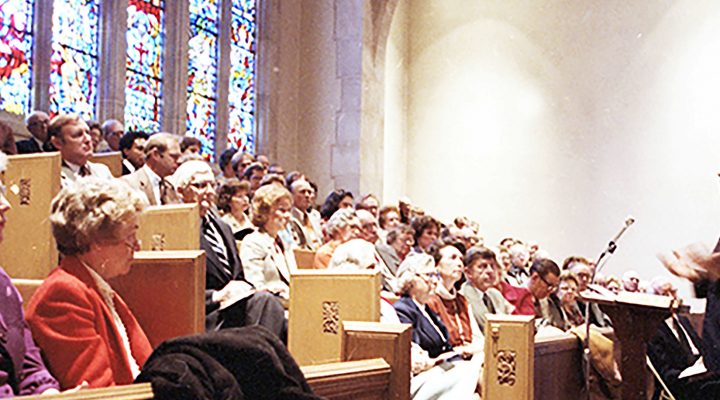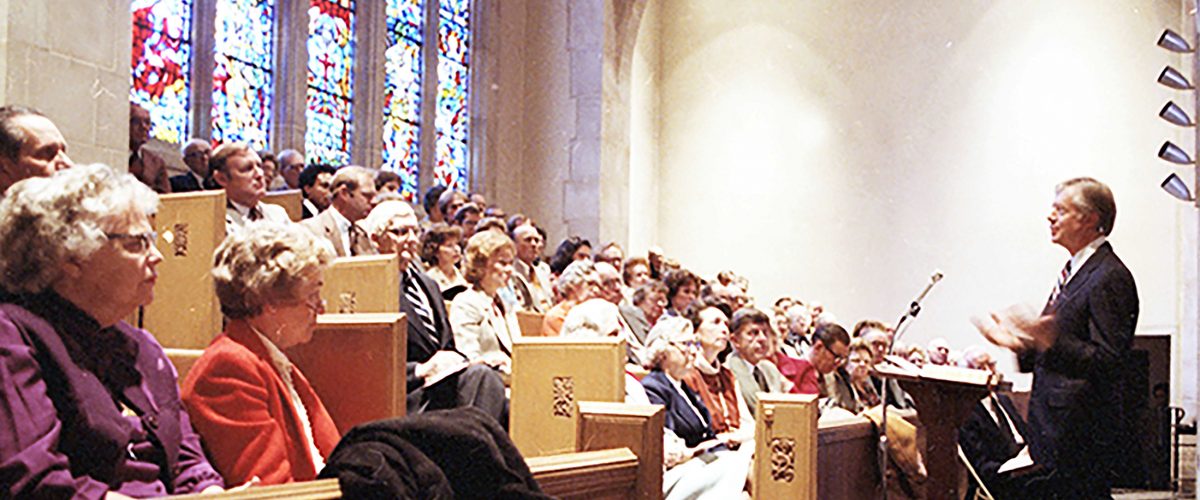Attending church and teaching Sunday school helped Jimmy Carter through some of the most challenging moments of his presidency, author Christi Harlan said.
While in the White House, Carter and his family were members and frequent attenders of The First Baptist Church of the City of Washington, D.C., where the president found an expression of his Baptist faith through teaching and a refuge from the stressors of the presidency during his 1977 to 1981 term, Harlan said.
Now 99, the former president and Georgia governor is currently on hospice care which he entered in March 2023 with a life-threatening illness. His wife, Rosalynn Carter, died in November 2023 at age 96.
 Harlan’s new book, Mr. President, the Class is Yours, presents transcripts from 14 Sunday school lessons Carter presented to a couples Bible class at the church. Titles range from “Jesus and the Holy Spirt” and “Facing Life’s Tensions” to “One Gospel for All People” and “Following Jesus’ Example.”
Harlan’s new book, Mr. President, the Class is Yours, presents transcripts from 14 Sunday school lessons Carter presented to a couples Bible class at the church. Titles range from “Jesus and the Holy Spirt” and “Facing Life’s Tensions” to “One Gospel for All People” and “Following Jesus’ Example.”
The transcripts were taken from recordings of Carter’s teaching discovered in church archives and include question-and-answer moments with students, good-natured ribbing with fellow teacher Fred Gregg and the president’s concordance-like recall of Scripture.
“It’s evident that this guy knows his Bible,” said Harlan, a First Baptist member and former reporter with the Wall Street Journal and Dallas Morning News.
Just as incredible is that Carter taught through some of the hardest periods of his presidency, including the Three Mile Island incident, the Soviet invasion of Afghanistan, the eruption of Mt. St. Helens and the Iran hostage crisis.
“It was just one thing after another, but he was somehow able to set it all aside and come to church and focus on a Sunday school lesson,” Harlan said. “It’s remarkable to me, and it speaks to his deep faith.”
The book shows how Carter occasionally updated students about the events occupying his time as president, including the 13 days in September 1978 he spent brokering the Camp David Accords between Israeli Prime Minister Menachem Begin and Egyptian President Anwar Sadat.
“Well, it’s always nice to come back from a two-week vacation at Camp David,” Carter joked with the class. “I think some of the most unpleasant moments of my life occurred during the last two weeks and, of course, also some of the most pleasant. One of the great things about the meeting was that I was meeting with two leaders who were deeply devout and religious men. Who spent a great portion of their time at Camp David in prayer. Who believe that they and I worship the same God.”
“Everybody knew where he was, but he still took the time to call. It’s astonishing.”
At one point during the Camp David talks, Carter called the church to say he would not be able to meet one of his Sunday teaching commitments, Harlan added. “You are the president of the United States, you have been locked up 13 days with the leaders of Israel and Egypt, but you still take time to call to say you are going to miss class? Everybody knew where he was, but he still took the time to call. It’s astonishing.”
Carter’s dedication to the class was matched by his gift for engaging and challenging participants to use what they learned at church, Harlan said. “He managed in every lesson to increase knowledge, and he was extremely good in pointing out real-life applications for that day’s lesson.”
Carter took that approach in “Forgiveness: A Two-Way Street,” a Dec. 10, 1978, lesson in which he used verses from Matthew 18, Luke 23 and Ephesians 4 to illustrate the importance of letting go of grudges.
“I would like to ask all of you, in closing, to do this as a good exercise. Sometime today, I would like to ask all of you just to make a list of one person or two or three or maybe as many as five people from whom you are estranged in some way or with whom you have strained feelings or interrelationships.”

Christi Harlan
Carter urged them to leave no stone unturned and to consider relationships with friends or family, people back home or in the workplace. “Just list the different names and then write down what they’ve done to hurt you. My guess is that when you write it down, you’ll begin to realize how frivolous it is. It’s something that you’ve clutched in your heart perhaps for 20 years as a real sense of resentment.”
While clearly talented at teaching, Carter and his family drew comfort from the normalcy they found at First Baptist — an angle to the story Harlan said she will tackle in her forthcoming book, Normal Lives.
That project will include an anecdote about 9-year-old Amy Carter pulling a loose tooth from her mouth during worship and climbing over several other people to hand it to her father. “Just being able to be regular members was so helpful to him. President Carter once said about the church, ‘You made our lives normal.’”
And they joined the congregation in the normal fashion, as well, Senior Pastor Julie Pennington-Russell explained in one of a series of videos C-SPAN produced in 2023 about Carter the Sunday school teacher.
“Just like everybody, they filled out a little blue, simple card and it’s just amazing to see the president’s signature, Mrs. Carter,and Amy. Jimmy and Rosalynn came by transfer of letter from First Baptist Church of Plains in Georgia. Little Amy came requesting baptism.”
Adhering to such traditions brought a sense of stability to the First Family, Harlan said. “When he came to church, he was just another guy in church. What I take from that is church was a haven for Carter during a presidency that was just dogged by unbelievably terrible events.”
Seeing how the president taught and worshipped despite the challenges he faced in office has been personally inspiring, Harlan said. “It has affected my walk of faith, absolutely. He is a great reminder that even with our busy lives it is possible to find ways to give and get spiritual nourishment.”


